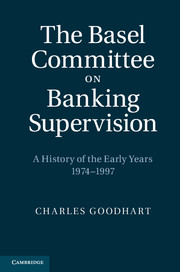Book contents
- Frontmatter
- Contents
- Figures
- Tables
- Foreword
- Preface
- 1 Introduction
- 2 The antecedents of the BCBS
- 3 Modus operandi
- 4 The Concordat
- 5 External and foreign exchange issues
- 6 Capital adequacy and the Basel Accord of 1988
- 7 The Market Risk Amendment
- 8 The Core Principles of Banking Supervision
- 9 Liquidity
- 10 Off-balance-sheet exposures and derivatives
- 11 Other topics addressed by the BCBS
- 12 The relationship of the BCBS with banks and other banking regulators
- 13 Relationships with other non-bank oversight and supervisory bodies
- 14 The legal position of the BCBS
- 15 The international relations of the BCBS
- 16 The BCBS and the social sciences
- 17 Epilogue
- Bibliography
- Index
1 - Introduction
Published online by Cambridge University Press: 07 September 2011
- Frontmatter
- Contents
- Figures
- Tables
- Foreword
- Preface
- 1 Introduction
- 2 The antecedents of the BCBS
- 3 Modus operandi
- 4 The Concordat
- 5 External and foreign exchange issues
- 6 Capital adequacy and the Basel Accord of 1988
- 7 The Market Risk Amendment
- 8 The Core Principles of Banking Supervision
- 9 Liquidity
- 10 Off-balance-sheet exposures and derivatives
- 11 Other topics addressed by the BCBS
- 12 The relationship of the BCBS with banks and other banking regulators
- 13 Relationships with other non-bank oversight and supervisory bodies
- 14 The legal position of the BCBS
- 15 The international relations of the BCBS
- 16 The BCBS and the social sciences
- 17 Epilogue
- Bibliography
- Index
Summary
Most people working in the financial sector have heard of the Basel Committee on Banking Supervision (BCBS), and have a reasonably good idea what it does, notably its responsibility for the Accords on Capital Adequacy, commonly known as Basel I and Basel II. Not so many know that the BCBS is a Standing Committee set up by, and reporting to, the central bank Governors of the G10 group of countries. Few would probably be able to name any of the other (in 2008 three) Standing Committees of the G10 Governors, or be able to describe what they did. Indeed, the name of each current Chairman of the BCBS has become probably better known worldwide than is the identity of the contemporaneous President of the G10 governors, and possibly better known than that of the contemporaneous General Manager of the Bank for International Settlements, at whose headquarters in Basel, Switzerland, the BCBS, G10 governors, and so on, meet, and which provides the Secretariat for all these groups. The names of the consecutive Chairmen of the BCBS, the Presidents of the G10 governors’ committee and the General Managers of the BIS during the years covered by this book (1974–97) are recorded in Appendix A of this chapter.
In short, the BCBS has become publicly well known, even famous; in some respects it is now perhaps the best-known member of the collection of BIS groups and institutions. How did this happen? It is a truism that finance and financial markets have become international, global, in scope whereas the regulation, supervision and control of financial systems have remained national, subject to national legislation and jurisdiction. This basic contrast has inevitably caused, and continues to cause, all kinds of tensions about competition between financial institutions headquartered in different countries (the ‘level playing field’ issue), about the coverage of supervision of international banks, about the relative responsibilities of home v. host regulators/supervisors, and so on. In particular, the level playing field issue meant that no single country could tighten its own financial regulations unilaterally without finding that its own banks might lose their competitive edge vis-à-vis their international rivals, certainly abroad and even possibly at home. The domestic banks could then become subject to a process known as disintermediation, whereby the more toughly regulated institutions lose business to their more lightly regulated competitors. This has meant that unilateral domestic regulation would normally be vehemently opposed by that country’s (international) banks. Since regulation, to be effective, does generally need the acquiescence of the regulated, at least up to a point, this has meant that financial regulation has to be coordinated on an international basis.
- Type
- Chapter
- Information
- The Basel Committee on Banking SupervisionA History of the Early Years 1974–1997, pp. 1 - 9Publisher: Cambridge University PressPrint publication year: 2011
- 2
- Cited by



